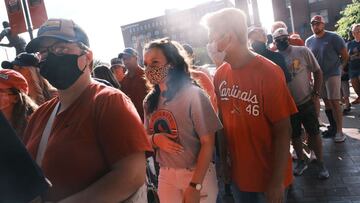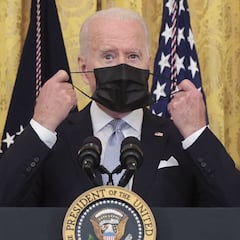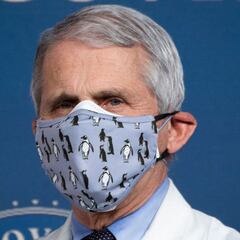How effective are masks against the Delta variant?
The new variant is causing rising infection rates and states are reimposing mask mandates to halt the spread.


No vaccine offers 100% protection against an illness and the covid-19 vaccines are no different. “Vaccinations give you that extra protection you wouldn’t normally have,” Dr. Erin Bromage from the University of Massachusetts said, “but when you hit a big challenge, like getting near an unvaccinated person who has a high viral load, that wall is not always going to hold.”
Another way people can keep safe is the continued use of masks. The CDC advises people to wear masks if they live in an orange or red zone of their covid-19 map, now encompassing about 80 percent of the counties in the United States. Some areas have started reimposing indoor mask mandates or rolling back bans on masks, like in Arkansas.
COVID cases in Arkansas are up 69% over the past 14 days. Gov. Asa Hutchinson says he regrets signing a ban on mask mandates in schools & wants the legislature to reverse it.
— Rep. Eric Swalwell (@RepSwalwell) August 4, 2021
Florida cases are up 128%. Gov. Ron DeSantis threatens to defund schools that require masks. 🤦🏻♂️
Despite being vaccinated it is possible to catch the virus again, although the risk of serious illness is very low. This is called a 'breakthrough case,' where people who have been vaccinated are starting to catch a disease again. This can happen if the vaccines are not efficient enough, a disease becames resistant to vaccines or the vaccine has begun to wear off. That is why some of the pharmaceutical companies are now recommending that the CDC allows a second or third jab in the autumn. The wearing of masks ensures that those whose vaccines have lost their efficacy are still protected. Those most at risk, due to the timing of vaccines, will be the oldest and the most vulnerable who were prioritised for vaccines when they first became available.
More Delta variant stories:
- China tightens restrictions and tests millions of people in Wuhan as covid-19 Delta variant spreads
- Which countries are in the ‘Level 4: Do not travel' category?
- What American companies require their employees to be vaccinated?
- When would it be necessary to have the third covid-19 vaccine?
- Vaccine mandate on federal workers: what other measures are included?
Different types of masks
Below are some of the most common types of face masks, in descending safety order.
N95/KN95/FFP2
These are the safest masks to wear but potentially the most uncomfortable. They filter out airborne particles larger than 0.3 microns, or one-millionth of a metre. Due to their shape, they fit most faces very well to prevent particles coming into the mask through the cheek area. However, due to their rigidity they can be the most uncomfortable yo wear for long periods of time.
Surgical Masks
While offering more protection compared to cloth masks, problems can arise due to the fit on the face. The square shape means they are likely to leave gaps near the cheeks which let particles in. They are not likely to keep out covid-19 if they don't fit perfectly. There are some good videos online to demonstrate how to fit the masks properly.
Cloth masks
Cloth maks can be the most beneficial for many people as they tend to be the most comfortable, meaning they can be worn for longer periods of time compared to the two others. However, they only provide protection of 20% to 50% of a N95 mask. The more tightly woven the material then the better the protection offered. These masks can be washed and reused as well, both being essential for keeping up hygiene and keeping away any illness from breathing in unclean bacteria.
Do facemasks protect against the Delta variant?
Related stories
Anthony Fauci told CNBC, “If you want to go the extra mile of safety, even though you’re vaccinated, when you’re indoors, particularly in crowded places, you might want to consider wearing a mask."
For the unvaccinated the CDC recommends wearing face masks in all places. For those vaccinated it also recommended due to the high viral load of the Delta variant. Many people who get covid-19 while vaccinated may not even realise as the symptoms will be very slight but there is still a risk of transmission. A facemask reduces this risk, especially as full indoor shopping and dining is reopening as well as large, crowded music festivals.

